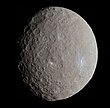(78799) 2002 XW93
| Discovery [1] | |
|---|---|
| Discovered by | Palomar team |
| Discovery site | Palomar Obs. |
| Discovery date | 10 December 2002 |
| Designations | |
| (78799) 2002 XW93 | |
| 2002 XW93 | |
| TNO [1] | |
| Orbital characteristics [1] | |
| Epoch 4 September 2017 (JD 2458000.5) | |
| Uncertainty parameter 4 | |
| Observation arc | 18.76 yr (6,852 days) |
| Earliest precovery date | 17 December 1989 |
| Aphelion | 46.785 AU |
| Perihelion | 28.065 AU |
| 37.425 AU | |
| Eccentricity | 0.2501 |
| 228.96 yr (83,626 days) | |
| 143.11° | |
| 0° 0m 15.48s / day | |
| Inclination | 14.389° |
| 46.951° | |
| 247.07° | |
| Physical characteristics | |
| Dimensions | 565 km[2] 584 km[3] |
| 5.5[1] | |
(78799) 2002 XW93 is a trans-Neptunian object from the outer Solar System, approximately 550–600 kilometers (340–370 mi) in diameter. It was discovered by and at the U.S Palomar Observatory, California, on 10 December 2002.[4] According to American astronomer Michael Brown, the minor planet is a likely dwarf planet.[3]
Orbit and physical characteristics
The minor planet orbits the Sun at a distance of 28.1–46.8 AU once every 228 years and 12 months (83,626 days). Its orbit has an eccentricity of 0.25 and an inclination of 14° with respect to the ecliptic.[1] A first precovery was taken at Palomar in 1989, and published by the Digitized Sky Survey, extends the asteroid's observation arc by 13 years prior to its official discovery observation.[4]
As of 2016, after a total of 29 observations, its orbital uncertainty parameter is at 3. Its last observation was made by the Hubble Space Telescope in September 2008.[4] On 10 August 1926, it most recently reached perihelion, when it was nearest to the Sun.[5][4] It is a near 5:7 resonant trans-Neptunian object.[citation needed]
Numbering and naming
This minor planet was numbered by the Minor Planet Center on 15 April 2004.[6] As of 2018, it has not been named.[4]
References
- ^ a b c d e "JPL Small-Body Database Browser: 78799 (2002 XW93)" (2008-09-20 last obs.). Jet Propulsion Laboratory. Retrieved 1 June 2017.
- ^ "List of Known Trans-Neptunian Objects". Johnston's Archive. Retrieved 2015-01-02.
- ^ a b "How many dwarf planets are there in the outer solar system?". Retrieved 2015-01-02.
- ^ a b c d e "78799 (2002 XW93)". Minor Planet Center. Retrieved 26 May 2016.
- ^ Marsden, Brian G. (2003-12-24). "MPEC 2003-Y55 : 2002 XW93". IAU Minor Planet Center. Harvard-Smithsonian Center for Astrophysics. Retrieved 2015-01-02.
- ^ "MPC/MPO/MPS Archive". Minor Planet Center. Retrieved 24 February 2018.
External links
- Asteroid Lightcurve Database (LCDB), query form (info)
- Discovery Circumstances: Numbered Minor Planets (75001)-(80000) – Minor Planet Center
- (78799) 2002 XW93 at the JPL Small-Body Database


